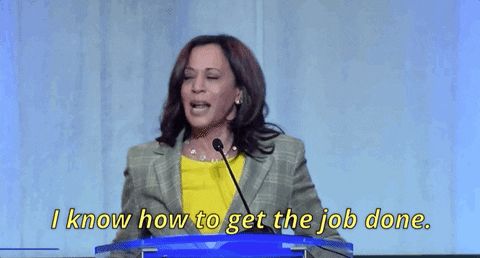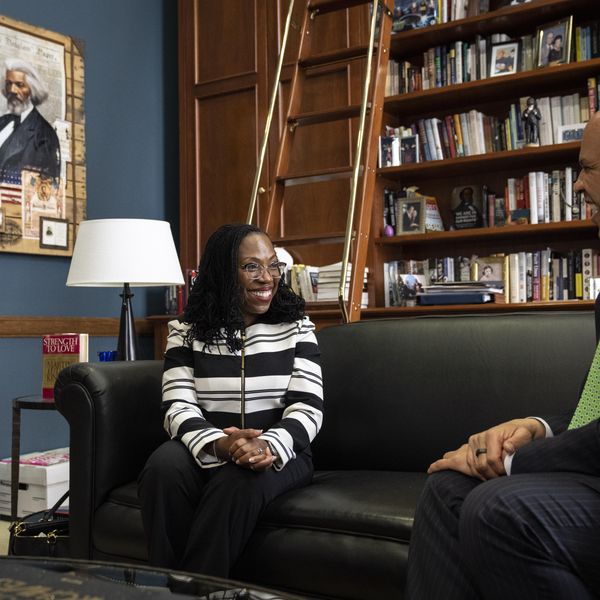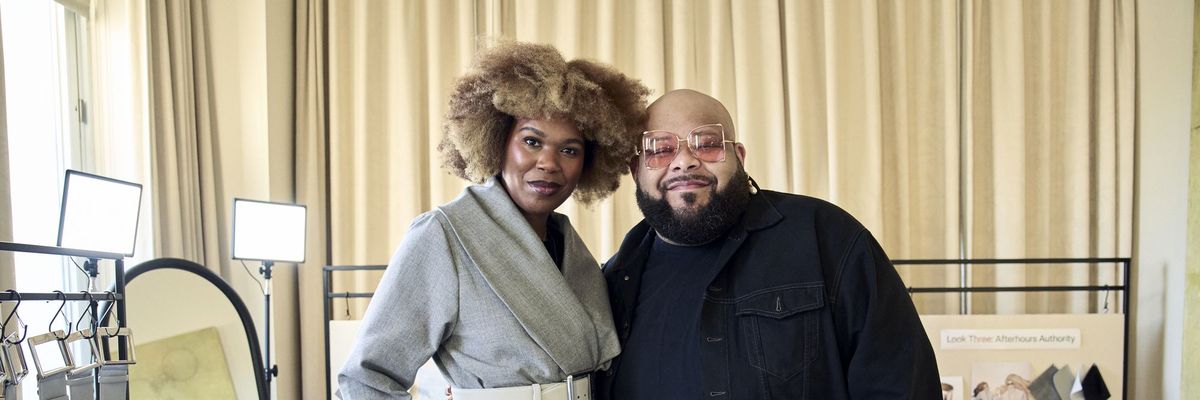#SayOurNames: Black Women’s Leadership & Our Quest For Equity
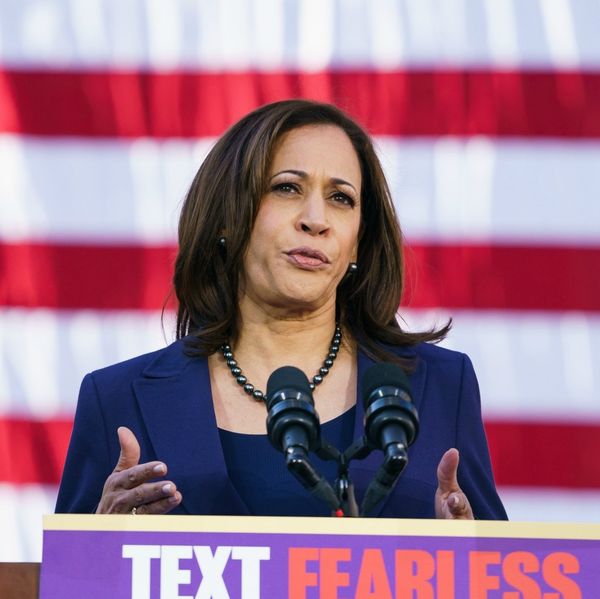
Last Wednesday evening (August 19), Senator Kamala Harris took the virtual stage of the 2020 Democratic Convention and addressed the nation as the first Black and South Asian woman to accept a major party's vice-presidential nomination.
From a pandemic to divisive leadership and economic uncertainty, Senator Harris' historic achievement comes at a time when our country is in dire need of leadership, and more specifically - Black women's leadership.
Because we know that when Black women step into their power, what needs to be done, will be done.
A Legacy of Leadership
Last week also marked 100 years since the passage of the 19th Amendment, and while Black women were integral to its passing, their fight for a seat at the political table was just beginning.
Harris' achievement is the latest in a legacy of Black women's suffragists whose leadership galvanized communities and shattered glass ceilings. She notes this in her speech at the 2020 Democratic Convention saying:
"They paved the way for the trailblazing leadership of Barack Obama and Hillary Clinton. And these women inspired us to pick up the torch, and fight on. Women like Mary Church Terrell and Mary McCleod Bethune. Fannie Lou Hamer and Diane Nash. Constance Baker Motley and Shirley Chisholm. We're not often taught their stories. But as Americans, we all stand on their shoulders."
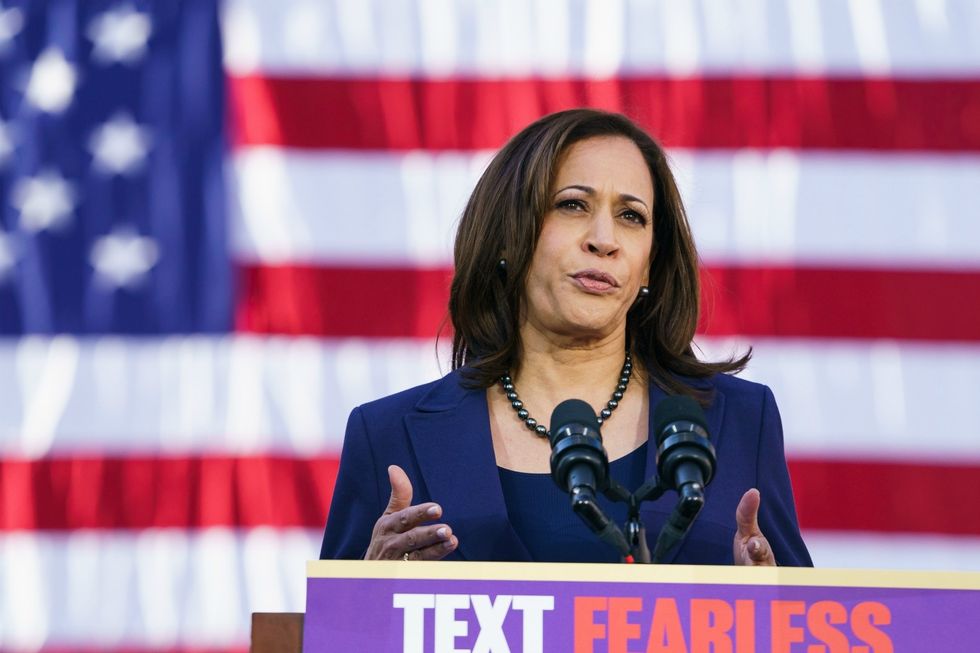
Image: Mason Trinca / Getty Images
In recent years, we've seen a new generation of Black women effecting change in politics, education, business, and beyond. Black women represent the fastest-growing segment of entrepreneurs, with the number of Black women-led startups doubling since 2016. They also represent the most educated demographic and have become a political force with a record number of Black women set to run for Congress.
Despite these advancements, Black women disproportionately face challenges at the intersection of race gender. These challenges are not new and actualize themselves in injustices such as workplace biases, disparities in health care, income inequalities, and the erasure of Black women in today's fight against police brutality.
"Anti-Black racism is once again at the center of national consciousness, an unavoidable reality amplified by twin pandemics—the COVID-19 pandemic and the uprisings in response to unyielding forms of state violence," said Shermena M. Nelson, Chief of Staff and Director of Programs and Community Engagement at the African American Policy Forum (AAPF). "Both COVID-19 and police violence have made blatantly apparent the racial inequalities that persist in American society."
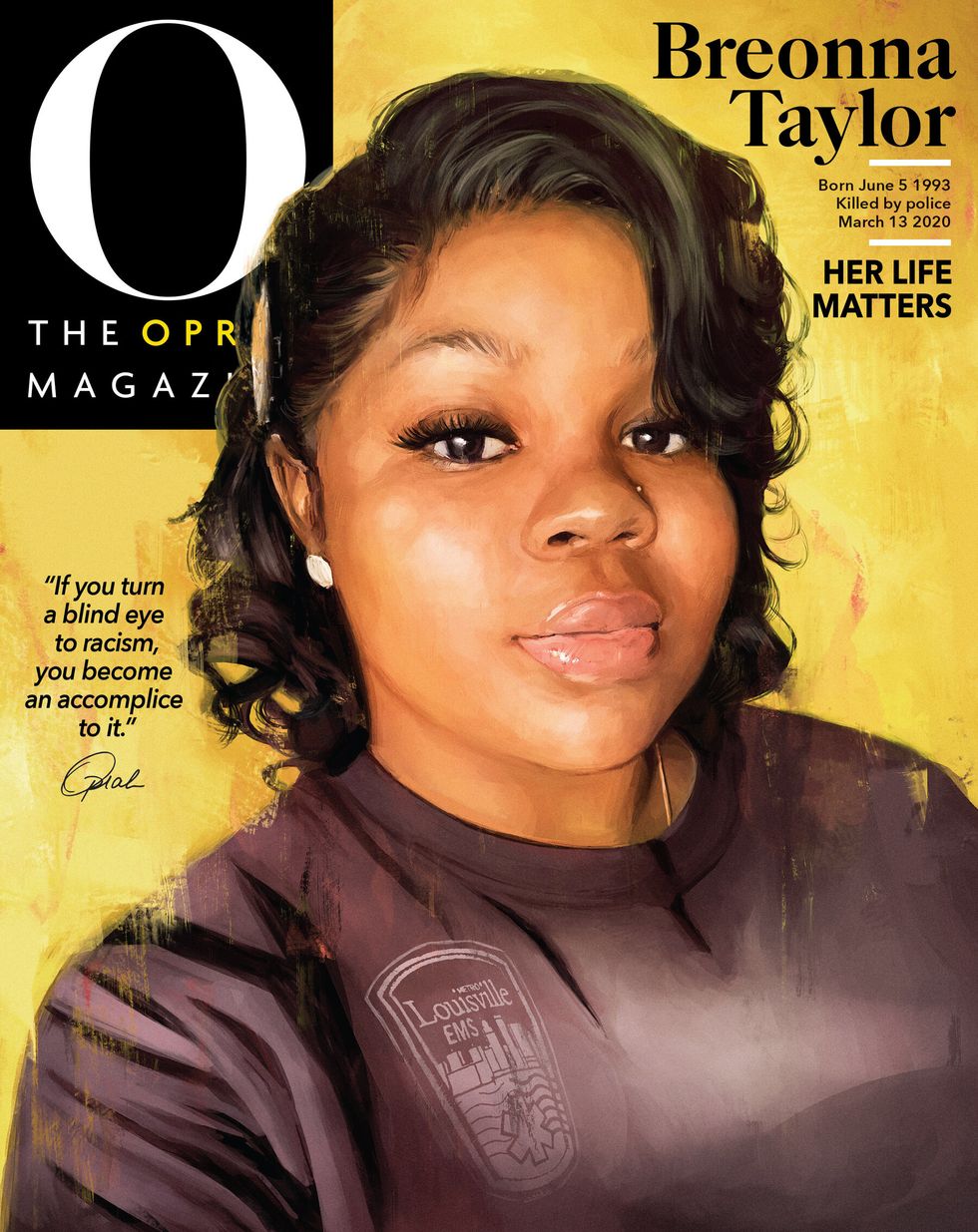
Image: September 2020 of 'O Magazine' honoring Breonna Taylor
For Nelson, AAPF's mission to dismantle structural racism and other barriers that disempower marginalized communities is increasingly important during this time of consciousness.
"We want to maximize this moment of attention, guiding attention to work that is transformative and sustainable. This cannot just be a moment."
Nelson joined a line-up of modern leaders like Linda Sarsour, co-founder of the Women's March, and Reverend Marcia Dyson at the virtual Black Womxn's Summit hosted by the Office of the Dean of the Chapel at Howard University, Senator Harris' alma mater. Hosted on Black Women's Equal Pay Day, the intra-racial summit celebrated Black womanhood while exploring other topics like education, health, sexism, and police brutality, among others, that uniquely impact Black women.
"With the killing of Breonna Taylor, we see once again the need for narratives that account for the racist police violence against Black women and girls. These stories are too often left untold, these names too often left unsaid."
Protecting Black Women in Today’s Social Climate
When it comes to Black women, public outrage often trails to that of their male counterparts. It's been approximately five months since Breonna Taylor's death and her murderers have still not been arrested.
We've seen this time again in cases of police violence toward Black women and girls like Oluwatoyin "Toyin" Salau, Atatiana Jefferson, Charleena Lyles, and Sandra Bland - a case that many of us first associated with #SayHerName, a 2014 campaign launched by AAPF to bring awareness to the names of these victims whose names we often do not hear.
But it shouldn't take for Black women's wrongful deaths to prompt action. How can we begin to effectively dismantle the structures that promote our erasure, so that we, and consequently all Americans, can walk in our full power?
"To properly diagnose and attempt to remedy the disparate violence we must use a framework of analysis that can identify the particulars of these two crises, namely, the ways in which race, gender, and class interact and compound," said Nelson. "We have to look at this as a structural issue. These killings are not just one case. One situation. One moment. They are the products of centuries of discrimination and systems that were uniquely crafted to oppress."
Our country is in a polarized, vulnerable state, one that presents many challenges, but the bright opportunity for widespread and institutional change - but only if we act. To do so, we must support organizations that are doing what is needed to knock down racial barriers and create pathways to equity.
"I believe there is a role for everyone. Education is a key way to support. Educate yourself, your colleagues, your friends. Make conscious, intentional efforts to elevate the movement. Lend your support to organizations who are doing the work (donate, volunteer, attend, promote), and remove your support from organizations and individuals who are opposed to the work."
The power to change leadership and advocate for existence lies in our right to vote. With arguably the most important election on the horizon, now is the time to show up for Black women the way they've always shown up for us all.
"This is not a time to passively observe or wait for others to step up. The time is now. We cannot wait."
To learn more and support the work of the African American Policy Forum, please visit aapf.org.
Featured image by Getty Images
This Is How To Keep 'Holiday Season Stress' From Infecting Your Relationship
Hmph. Maybe it’s just me, but it seems like there is something really weird happening in the fall season air (because winter doesn’t officially begin until December 21) that cuddle season is in full swing while break-up season is as well. In fact, did you know that break-ups are so popular during the holiday season that December 11 is deemed Break-Up Day?
The reasons why relationships shift around this time vary; however, I did both roll my eyes and chuckle when I read that a very popular one is because it’s an easy way to get out of getting one’s significant other a Christmas present. SMDH.
Anyway, I personally think that the less shallow folks out here may contemplate calling things “quits” or they at least distance themselves a bit from their partner (and what I’m referring to is serious relationships) due to all of the stress and strain that oftentimes comes with the holidays whether it be financial, familial, due to their tight schedules or something else.
Listen, I would hate for you and your man to miss the fun and happiness of experiencing this time of year, all because you are so overwhelmed or irritated that you can’t really enjoy it. That’s why I have a few practical tips for how to avoid allowing the typical holiday season stress from INFECTING your relationship.
Manage Your Expectations
 Giphy
GiphyUnmanaged expectations. If there is a main reason why the holiday season tends to be so stress-filled for so many people, I’d bet good money that this is the cause. And when you’re in a long-term relationship, expectations can manifest themselves in all sorts of cryptic and/or unexpected ways. You might have relatives who assume that you are going to be with them for Thanksgiving or Christmas when you have other plans in mind. You might be thinking that you are going to spend one amount for presents while your man is thinking something totally different. When it comes to scheduling, your signals may be crossed.
And you know what? To all of these scenarios, this is where clear and consistent communication come in. Don’t assume anything. Don’t dictate anything either. From now until New Year’s, mutually decide to check in once a week, just to make sure that you are both on the same page as it relates to the holidays and what you both are thinking will come along with it. The less blindsided you both feel, the less stressed out you will be. Trust me on this.
Set (and Keep) a Budget
 Giphy
GiphyOkay, so I read that last year, 36 percent of Americans incurred some type of holiday-related debt. Hmph. Last year, there was still some sense of normalcy in this country, chile, so I can only imagine what finances are gonna look like over the next several weeks. That said, since I don’t know a lot of people who don’t find being broke stressful, make sure that you and your bae set a budget and then stick to it this year — no ifs, ands or buts.
Because really, y’all — it doesn’t make sense to deplete savings and/or max out credit cards for a few days of giggles only to be damn near losing your mind because you don’t know how to make ends meet come Dr. Martin Luther King, Jr. Day.
And by the way, this tip doesn’t just speak to things like food and gifts; I also mean travel. If it doesn’t make a ton of sense (or cents) to be all over the place this year — DON’T BE.
Keep Matthew 5:37 at the Forefront
 Giphy
GiphyIf off the top of your head, you don’t know what Matthew 5:37 says, no worries, here ya go: “But let your ‘Yes’ be ‘Yes,’ and your ‘No,’ ‘No.’ For whatever is more than these is from the evil one.” That verse right there? Oh, it’s a boundaries lifesaver! I say that because do you see “maybe” or “I’ll think about it” in there? Nope. LOL. It says that you should tell people “yes” or “no” and leave it at that — and that complements Anne Lamott’s quote, “’No’ is a complete sentence” impeccably well. Yeah, you’ve got to remember that anything beyond a yes or no to a request is privileged information; you don’t owe anyone details or an explanation.
Besides, if you are really honest with yourself, when someone asks you something and you give a “Umm, let me think about it” kind of reply, more times than not, you already know what your answer is going to be — so why not let you both off of the hook? Give your response. Commit to that. And let everyone (including yourself) get on with their lives and schedules.
I promise you that when it comes to those holiday parties, you are pissing more folks off by not RSVP’ing or doing so and not showing up than just saying, “Thank you but not this year” off the rip.
Remember That Your Personal Space Is Privilege Not a Right
 Giphy
GiphyA friend of mine recently bought a new house and invited me over to come see it. He’s a single man with no children, so as I was taking in all of the space that he had, especially as I walked through his finished basement, I joked about relatives coming to live with him. “Hell no” and “absolutely not” were pretty much his immediate responses as he went on to say that some folks even had the nerve to be offended when he told them that he had no intentions on taking DNA in.
Ain’t it wild how people think that your stuff is their right? And yes, that brings me to my next point. Your home is your sanctuary space. If you want to host folks this year — cool. If not, ALSO COOL. Please don’t let folks (family included) guilt you into how they want you to act or even into what they would do if the shoe was on the other foot. You are not them — and as one of my favorite quotes states, “If two people were exactly alike, one of them would be unnecessary.” (A man by the name Larry Dixon said that.)
Hell, my friends? They know that I am good for sending them random things that they need or even want all throughout the year. Coming over to hang out at my pace, though. Uh-uh. Chalk it up to being a card-carrying member of the ambivert club yet I like keeping my living space personal — and I sleep like a baby, each and every night, for feeling that way.
Always remember that your space, your time, your resources, your energy and shoot, yourself period (including your relationship), are all things that are your own. You get to choose how, when and why you want to share them. The holiday season is certainly no exception.
Cultivate Some “You Two Only” Traditions
 Giphy
GiphyIt’s not uncommon for some couples to hit me up after the holiday season to “detox.” Sometimes it’s due to the financial drama (and sometimes trauma) that they experienced. Sometimes it’s because they allowed their relatives (especially in-laws) to get more into their personal business than they should’ve. More than anything, though, it tends to be because they didn’t get enough quality time together and so ended up feeling “disconnected.”
Please don’t let that happen. Listen, I’m not even a holidays kind of woman and yet, I will absolutely sit myself down with some hot chocolate and chocolate chip cookies to enjoy a Hallmark holiday film or two. Aside from the fact that most of them are lighthearted and sweet, I also like that they usually focus on couples loving on each other amidst all of the holiday beauty and ambiance — which is something that all couples should set aside some time to do.
Maybe it’s a vacation. Maybe it’s a staycation. Or maybe it’s my personal favorite, A SEXCATION. Whether it’s for a few days, the weekend or even overnight — don’t you let the holidays go by without setting aside time for you and your man to celebrate one another. Don’t you dare (check out “Are You Ready To Have Some Very Merry 'Christmas Sex'?”).
GET. SOME. REST.
 Giphy
GiphyI once read that 8 out of 10 people get stressed out over the holidays and 3 out of 10 lose sleep during to it — and when you’re stress-filled and sleep-deprived, that can absolutely lead to hypersensitivity, making mountains out of molehills and even not being in the mood for sex.
Your relationship can’t afford to go through any of this, so definitely make sure to prioritize rest. I don’t care how unrealistic it might seem during this time, sleep should never be seen as a luxury; it will always and forever be a great necessity.
That said, try to get no less than six hours of shut-eye in (check out “6 Fascinating Ways Sex And Sleep Definitely Go Hand In Hand”) and even ask your bae to take a nap with you sometimes (check out “Wanna Have Some Next-Level Sex? Take A Nap, Sis.”). Not only will sleep help to restore your mind, body and spirit but, when it’s with your partner, it’s an act of intimacy that can make you both feel super connected, even in the midst of what might feel like chaos.
___
Holiday season stress is real. Still, never give it the permission or power to throw your relationship off. Put you and your man first and let the holidays be what they are gonna be, chile.
Let’s make things inbox official! Sign up for the xoNecole newsletter for love, wellness, career, and exclusive content delivered straight to your inbox.
Featured image by Shutterstock
Sergio Hudson On Designing With Intention And Who Gets Left Out Of The Industry
Sergio Hudson dreamt big as a young South Carolina boy staring out of the window of his mom’s Volvo driving down the Ridgeway, South Carolina streets. Those dreams led him to design opulent tailoring that’s been worn by Beyoncé, Queen Latifah, former Vice President Kamala Harris and Forever First Lady Michelle Obama, just to name a few.
Those dreams have come full circle in a new way as he recently collaborated with Volvo for a mini capsule collection suitable for chic and stylish moments this fall. The 40-year-old designer follows a long legacy of fashion aficionados who’ve used their innovation to push the automotive industry forward, including Virgil Abloh, Eddie Bauer, Paul Smith and Jeremy Scott.
Using the same material from the interior of the Volvo EX90, Hudson crafted a wool-blend car coat and waistbelt that combine the vehicle’s Scandinavian design with his signature tailoring and intention. The exclusive collection launched on October 20, and each piece is made-to-order by Sergio Hudson Collections.

Courtesy
In October, I traveled to Charleston with a group of journalists to get a firsthand look at Hudson and Volvo’s location. During a fitting, Hudson said his goal is to make “great work that can stand the test of time.”
“People can look back on and say, ‘I remember when Sergio did that collaboration with Volvo,’” he continued. “Thinking about aligning yourself with classic brands that speak to where you want to go. And I think that's what this collaboration kind of means to me and my business.”
Hudson pinpoints his mom as the biggest influence for his designs. This collaboration was no different.
“This particular coat reminded me of the swing coats that my mom used to wear in the early 90s. You know, diva girls in the early 90s had Sandra suits,” he said, referring to Jackée Harry’s character in 227. “My mom wore those and she would have these matching swing coats to go over them. And that's where the initial idea came. This would be around the same time that we had our Volvo. So she would put on her suit, her swing coat, get in that red Volvo, and go to church.”

Courtesy
With this capsule and beyond, Hudson wants to see more staples rotating in and out of closets this fall. He advises fashionistas to build her closet out with essentials to mix and match that aren’t just stylish but also sustainable.
“It's just those special pieces,” he said. “You can wear the same shirt and pants every day and nobody will notice. But if you have a special boot, a special coat, a special bill, a special bag, that kind of speaks to everything that your style stands about, that is something you should focus on.”
These are the same kind of staple pieces that return to our Pinterest boards and TikTok feeds season after season. Fast fashion has never been Hudson’s aim. “I'm trying to create a special pieces that can stand the test of time,” he said in his warm, Southern accent. “I'm only creating those kind of pieces from here on out.”

Courtesy
For Hudson, this collaboration is revolutionary. It’s his first time working with a car company and experimenting outside of his wheelhouse in this way.
“This is a Scandinavian brand, and, you know, it's 70 years old. I'm an African-American boy from South Carolina that has had a brand for 10 years. So I think bridging those two worlds and seeing the similarities was the beauty of this project,” he explained.
Though Hudson and his partner and CEO of Sergio Hudson Collections Inga Beckham have made massive strides in just 10 years, Hudson said the industry is far from where he wants to see it when it comes to Black representation. He pointed to how few Black designers were at this year’s Met Gala despite the theme being Black dandyism.
“The fact that I dressed 18 people speaks to how many of us weren't there,” he said. He implored more of industries, fashion and beyond, to collaborate with Black designers often.
“Allow mentorship. Allow funding. Allow great design to shine through,” he implored. “When it comes to being a designer of African descent, when you can't get the funding that your counterparts have, you can't compete. When you get opportunities like doing a collaboration with Volvo, or you get opportunities to be at the Met Gala, that's putting us on the equal playing field, but really the funding behind it is what we need to take it to that desk level.”
Featured image courtesy



